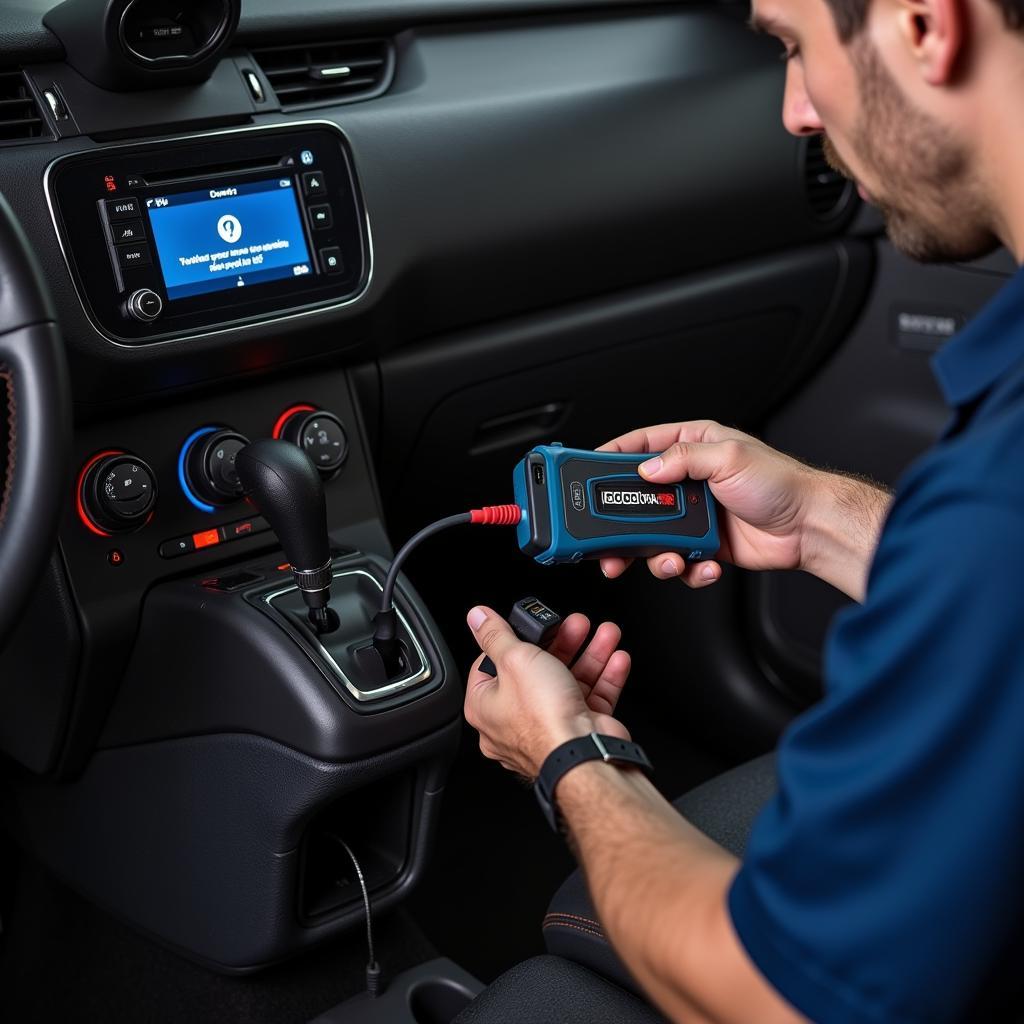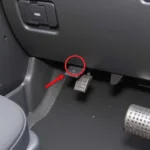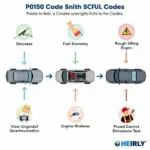An OBD2 scanner is an essential tool for diagnosing and troubleshooting car problems. However, there are times when your OBD2 scanner will not link to your vehicle, leaving you frustrated and unable to pinpoint the issue. This inability to establish a connection can stem from various factors related to the scanner, your vehicle, or even compatibility issues between the two.
Common Reasons Why Your OBD2 Scanner Will Not Link
Here are some of the most frequent reasons why you might encounter connectivity problems with your OBD2 scanner:
- Faulty OBD2 Scanner: The scanner itself might be malfunctioning due to internal issues, a damaged cable, or outdated software.
- Blown OBD2 Fuse: Your vehicle’s OBD2 system is protected by a fuse. If this fuse blows, the scanner won’t be able to draw power or communicate.
- Damaged OBD2 Port or Wiring: Physical damage to the OBD2 port on your vehicle or the wiring harness connected to it can interrupt communication.
- Incompatible OBD2 Protocols: Cars use different communication protocols within the OBD2 standard. Your scanner needs to support the specific protocols used by your vehicle’s make and model.
- Low Vehicle Battery: A weak car battery can disrupt the OBD2 system’s ability to communicate with the scanner.
- Software or Firmware Issues: Outdated software on the scanner or outdated firmware on your vehicle’s ECU (Engine Control Unit) can lead to compatibility problems.
Troubleshooting Steps When Your OBD2 Scanner Won’t Connect
If you find yourself in a situation where your OBD2 scanner refuses to link, don’t panic. Here’s a step-by-step guide to help you troubleshoot the issue:
- Check the Basics: Ensure the scanner is turned on and your vehicle’s ignition is switched to the “On” position (engine not necessarily running).
- Inspect the OBD2 Port: Look for any visible damage, debris, or bent pins within the OBD2 port on your vehicle.
- Verify OBD2 Fuse: Consult your vehicle’s owner’s manual to locate the OBD2 fuse and check if it’s blown. Replace it with a fuse of the correct amperage if necessary.
- Test with Another Vehicle: Try connecting your scanner to a different vehicle (if possible). If it connects successfully, the problem likely lies with your vehicle.
- Try a Different OBD2 Scanner: If available, use another OBD2 scanner to connect to your vehicle. This helps determine if the issue is with the scanner itself.
- Check Battery Voltage: Use a multimeter to measure your vehicle’s battery voltage. It should ideally read around 12.6 volts when the engine is off.
- Consult a Mechanic: If the problem persists, it’s best to consult a qualified mechanic who can diagnose the issue with professional equipment.
Preventing OBD2 Scanner Connection Problems
Prevention is always better than cure. Here are some tips to minimize the chances of facing OBD2 scanner connection problems in the future:
- Regularly Check Your Vehicle’s Battery: Ensure your car battery is in good condition and holds a proper charge.
- Handle the OBD2 Port with Care: Avoid inserting foreign objects or applying excessive force when connecting or disconnecting the scanner.
- Keep Your Scanner Updated: Manufacturers often release software updates to address bugs and improve compatibility.
- Consult Your Vehicle’s Manual: Refer to your owner’s manual for specific information about your vehicle’s OBD2 system and any recommended scanners.
“A common mistake people make is assuming the OBD2 port is universal,” says automotive electronics specialist, John Miller, “while all cars made after 1996 have the port, the communication protocols can vary, leading to compatibility issues.” He emphasizes the importance of understanding the specific requirements of your vehicle model.
Understanding OBD2 Protocols
OBD2, which stands for On-Board Diagnostics, is a standardized system that allows external devices like scanners to access a vehicle’s diagnostic information. Within the OBD2 standard, there are several communication protocols that dictate how the scanner and the vehicle’s computer exchange data.
Some common OBD2 protocols include:
- SAE J1850 PWM: Used by some Ford vehicles.
- SAE J1850 VPW: Used by some General Motors vehicles.
- ISO 9141-2: Common in older European and Asian vehicles.
- ISO 14230-4 (KWP2000): Also common in European and Asian vehicles.
- ISO 15765-4 (CAN): The most widely used protocol today, found in most modern vehicles.
When purchasing an OBD2 scanner, ensure it supports the specific protocols used by your vehicle. You can usually find this information in your owner’s manual or by searching online using your vehicle’s year, make, and model.
Conclusion
Encountering an “OBD2 scanner will not link” issue can be a roadblock when you’re trying to diagnose your car troubles. By understanding the common causes, following the troubleshooting steps, and taking preventative measures, you can significantly reduce the likelihood of facing this problem. Remember, a properly functioning OBD2 scanner is a valuable asset in keeping your vehicle running smoothly.
FAQs
Q1: Why is my OBD2 scanner not connecting to Bluetooth?
A: Ensure Bluetooth is enabled on both your scanner and smartphone/device. Make sure they are paired correctly and within range. Check the scanner’s manual for specific pairing instructions.
Q2: Can I drive my car with the OBD2 scanner plugged in?
A: Yes, it’s generally safe to drive with the scanner connected. However, avoid leaving it plugged in for extended periods when the engine is off to prevent battery drain.
Q3: What does a flashing check engine light mean?
A: A flashing check engine light usually indicates a more serious problem that requires immediate attention. It’s best to get your vehicle diagnosed by a mechanic promptly.
For further assistance with your OBD2 scanner or any vehicle diagnostic needs, feel free to reach out to our expert team. Contact us via WhatsApp: +1(641)206-8880 or Email: [email protected]. We offer 24/7 customer support to help you get back on the road.


